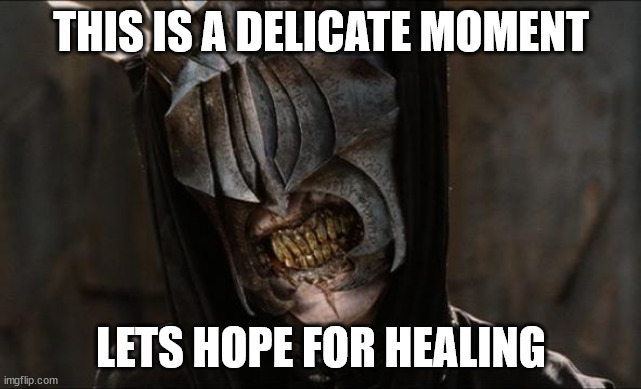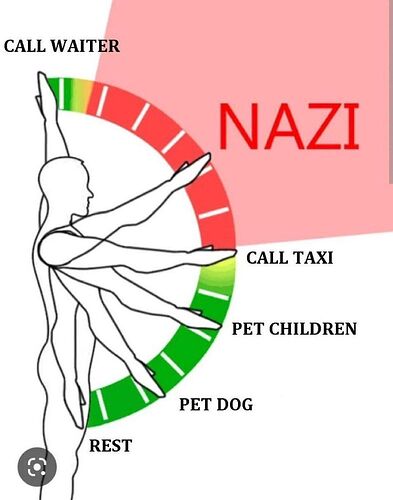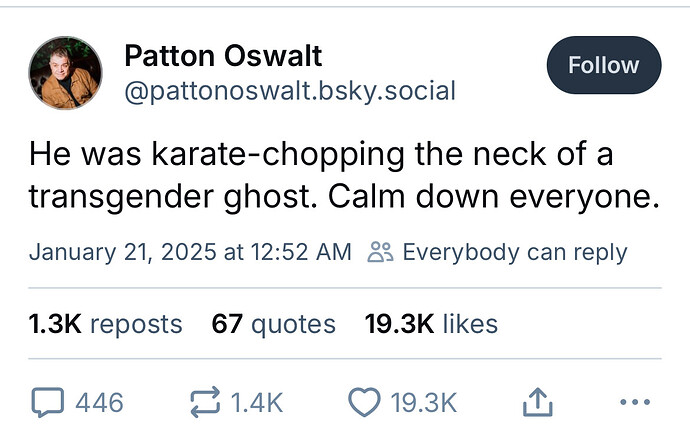Ok, I guess it’s officially an enthusiastic gesture then. And Musk would love to be known for his enthusiasm, right? So can we make this the picture of him we use for everything? Every single thing from news stories to wikipedia to books about our time, so everyone can forever be reminded what an enthusiastic guy he is, right beside some of those other fellas who made rockets and aimed for the Moon (but sometimes hit London)?
“All sides should give grace” What the actual fuck, ADL? When have you ever seen the fascists give one iota of grace? Fuck off…
Yeah, I dunno. Mildly criticize Netanyahu, and the ADL will call you antisemitic and demand an apology. Literally and unambiguously give a Nazi salute…twice…and hey, it was just an awkward gesture.
They have to know they are on the menu, right? Surely they are not that shortsighted.
Maybe we’re jumping to conclusions. Maybe it’s only an apartheid salute.
“The leopards aren’t going to eat our faces, right? Right?!?”
I’ve got an enthusiastic gesture for Musk.
“but musk never stood by palestine!” – ADL Logic
This one?
-
Your honor, this man is clearly a nazi.
-
Duh, If you brought nazism to this discussion it is because you ran out of facts.
-
You are right.I pronounce you not guilt as Godwin’s Law.
I apologize for my broken English
My wife went to her xitter account, which she keeps for her business and found a new “Grok” button. When she pushed it, it said she is a baker and ardent advocate of healthcare practices like masking and vaccines. She also freely criticizes political leaders. Her favorite quote is “Would you just shit up, man!” by Joe Biden. I want to puke. This is a target on my wife. Fucking nazi bastards.
“Move fast and break things” is getting way more micromanage-y these days.
For those who run a business and kinda hafta have a social media account, it’s going to be even more of a tightrope walk every day.
Cory Doctorow had a useful piece but in it he does identify the captured-audience-cost-of-leaving thing:
Many of us have left the big social media platforms; far more of us wish we could leave them; and even those of us who’ve escaped from Facebook/Insta and Twitter still spend a lot of time trying to figure out how to get the people we care about off of them, too.
It’s lazy and easy to think that our friends who are stuck on legacy platforms run by Zuckerberg and Musk lack the self-discipline to wean themselves off of these services, or lack the perspective to understand why it’s so urgent to get away from them, or that their “hacked dopamine loops” have addicted them to the zuckermusk algorithms. But if you actually listen to the people who’ve stayed behind, you’ll learn that the main reason our friends stay on legacy platforms is that they care about the other people there more than they hate Zuck or Musk.
They rely on them because they’re in a rare-disease support group with you; or they all coordinate their kids’ little league carpools there; or that’s where they stay in touch with family and friends they left behind when they emigrated; or they’re customers or the audience for creative labor.
All those people might want to leave, too, but it’s really hard to agree on where to go, when to go, and how to re-establish your groups when you get somewhere else. Economists call this the “collective action problem.” This problem creates “switching costs” - a lot of stuff you’ll have to live without if you switch from legacy platforms to new ones. The collective action problem is hard to solve and the switching costs are very high:
How to Leave Dying Social Media Platforms – Pluralistic: Daily links from Cory Doctorow
That’s why people stay behind - not because they lack perspective, or self-discipline, or because their dopamine loops have been hacked by evil techbro sorcerers who used Big Data to fashion history’s first functional mind-control ray. They are locked in by real, material things.
Big Tech critics who attribute users’ moral failings or platforms’ technical prowess to the legacy platforms’ “stickiness” are their own worst enemies. These critics have correctly identified that legacy platforms are a serious problem, but have totally failed to understand the nature of that problem or how to fix it. Thankfully, more and more critics are coming to understand that lock-in is the root of the problem, and that anti-lock-in measures like interoperability can address it.
But there’s another major gap in the mainstream critique of social media. Critics of zuckermuskian media claim those services are so terrible because they’re for-profit entities, capitalist enterprises hitched to the logic of extraction and profit above all else. The problem with this claim is that it doesn’t explain the changes to these services. After all, the reason so many of us got on Twitter and Facebook and Instagram is because they used to be a lot of fun. They were useful. They were even great at times.
When tech critics fail to ask why good services turn bad, that failure is just as severe as the failure to ask why people stay when the services rot.
…
…
Last week, I endorsed a project called Free Our Feeds, whose goals include hacking some fire exits into Bluesky by force majeure - that is, independently standing up an alternative Bluesky server that people can retreat to if Bluesky management changes, or has a change of heart:…








